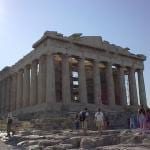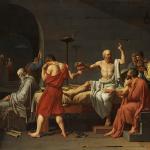This is one way of understanding the “difficult” passage of Jesus cursing the fig tree in both Mark and Matthew:
18 Now in the morning as he returned into the city, he hungered.
19 And when he saw a fig tree in the way, he came to it, and found nothing thereon, but leaves only, and said unto it, Let no fruit grow on thee henceforward forever. And presently the fig tree withered away.
20 And when the disciples saw it, they marveled, saying, How soon is the fig tree withered away!
There are many theological truths in this passage dealing with God’s people and the rejection of the Messiah. There are deep things of God that the Fathers and Mothers of the Church explain to us. Sometimes I meet an Internet atheist who will wonder why Jesus lost his temper. Fig trees were not in season. He was hungry, but this was not the fig tree’s responsibility! Why curse the fig tree? Ignoring the lesson of the fig tree, he wants to know why hungry Jesus would go to an out of season fig tree.
If this critic were to think for a moment, he would recollect that Jesus was the God-man. He lived in the divine eternity in His divine nature and with us in time in His human nature. For most of us, when we wish “figs” or any other food, we must check with external reality to see if our desire is appropriate to what is. If we demand reality give us figs, and grow angry when figs are not in season, we are (most likely) being selfish and foolish.
Jesus as a man as men should be had a deeper experience of the world than we have. When the Son of Man hungers for figs, then figs should be in season! His nature was in perfect harmony with the Divine will, but the cosmos was out of sync. Jesus was the only man in history who could be sure his desires were God’s desires.
The fig tree (and the cosmos) were cursed already. They did not give the Son of Man figs. The “time for figs” in the lagging cosmic time “was not yet.” The very hunger of the Son of Man showed that the cosmos was not in harmony with divine will. As a result, the fig tree, beautiful out of the divine context, was revealed as ugly, not synchronized with the source of beauty.
Ugliness is untimely beauty in a creation out of harmony with God. Ugliness is broken beauty, not an “opposite” of beauty, so no perfectly ugly thing exists. All the creation is good, so there is good to anything that exists. Of course, misusing, warping, or twisting beauty is terrible. Creating ugliness, broken beauty, is horrid from the start, because the genesis of ugliness is the misuse of beauty. There are also objects that have such terrible ugliness that they are dangerous to us and are terrible. Part of the condemnation is that whatever power such artifacts have comes from the beauty and truth retained and misused.
The world is not as it should be, but the world is still fundamentally good. Scratch the cosmos and one finds goodness sustained in all that is.
Every baby on Earth that hungers should have food, but due to a combination of human and cosmic brokenness, food is not always there. Unlike Jesus, none of us, broken as we are, can be sure all our desires for figs are right. Most often, they are disproportionate, and we should fast until figs are in season. Yet sometimes, the season is Pascha when there should be feasting and the world gives us a pandemic, because the world is under a curse.
Imagine a perfect harmony between our desires, our loves, and the cosmos. When we wish to drink, we open our mouths and rain falls. When the Earth must tremble, we already have moved to another region. We hear what God is doing and respond. No baby starves because every mother has the nourishment she needs. When provisions are needed, wisemen come to give gold, frankincense, and myrrh.
This is not a fantasy. If we look, think about the cosmos as driven by love as created by a God who is love, then we see that despite the brokenness love shines through the brokenness. The earth is abundant and makes many figs!
We see this all the time: the harmony of our needs and the melody of the cosmos.
Once I was incredibly sad and felt hopeless about my present situation. I was driving home and asked God to help me. When I drove into my driveway, I looked up and there was a beautiful rainbow over my house. I am not important enough to be the sole reason for this rainbow, but at that moment nature and Nature’s God and my small sadness were in harmony. God gave the world a rainbow and I needed a rainbow, too.
That is the way Adam experienced the garden. Jesus wept when that perfect harmony was missing.
Creation was a divine romance. God made a good cosmos and people. He provided all that we needed in superabundance. This harmony is the very essence of objective beauty: God’s eternal love synchronizing with our desires.
All we want is what God provides. God gives more than we know we want and delights to give us this absolute romantic fulfillment. This beauty, cosmic and Divine, stirs love in us. We eat the fig and savor the goodness: “This is just the food for which we hungered!”












